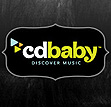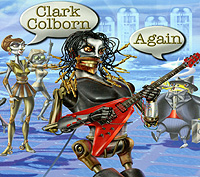 Sometimes
heavy metal music can be so heavy. With distorted guitars pushing
the needles to the red, much hard rock or heavy metal is way too heavy
for some discerning ears. Case in point where heavy metal instrumental
and rock music is played and recorded just right is Clark Colborn
Again, the 2011 CD from Illinois guitarist Clark
Colborn. Hipped to rock writers and mags by in-the-know prog and
rock fans, Clark hits his stride with his latest opus, which skillfully
mixes a few vocal tracks into a predominantly instrumental rock album.
Clark gets compared to guitar aces like Page, Vai and Van Halen, yet
he maintains, ‘I want my music to be fun to listen to, stimulating
to play and to convey a sense of energy to my audience.’ Perhaps
the most unique thing here is the recording sound, which is first
rate, distortion free and superbly mastered—especially for what
ostensibly sounds like a heavy metal album. Clark handles everything
including vocals, with all the instruments skillfully handled by Clark
and drummer Joel Baer. With its myriad of electrifying rock
guitar pyro-technics, Clark Colborn Again takes you on a sonic
trip back into the future. www.ClarkPlaysGuitar.com
Sometimes
heavy metal music can be so heavy. With distorted guitars pushing
the needles to the red, much hard rock or heavy metal is way too heavy
for some discerning ears. Case in point where heavy metal instrumental
and rock music is played and recorded just right is Clark Colborn
Again, the 2011 CD from Illinois guitarist Clark
Colborn. Hipped to rock writers and mags by in-the-know prog and
rock fans, Clark hits his stride with his latest opus, which skillfully
mixes a few vocal tracks into a predominantly instrumental rock album.
Clark gets compared to guitar aces like Page, Vai and Van Halen, yet
he maintains, ‘I want my music to be fun to listen to, stimulating
to play and to convey a sense of energy to my audience.’ Perhaps
the most unique thing here is the recording sound, which is first
rate, distortion free and superbly mastered—especially for what
ostensibly sounds like a heavy metal album. Clark handles everything
including vocals, with all the instruments skillfully handled by Clark
and drummer Joel Baer. With its myriad of electrifying rock
guitar pyro-technics, Clark Colborn Again takes you on a sonic
trip back into the future. www.ClarkPlaysGuitar.com
mwe3.com presents an interview with
CLARK COLBORN
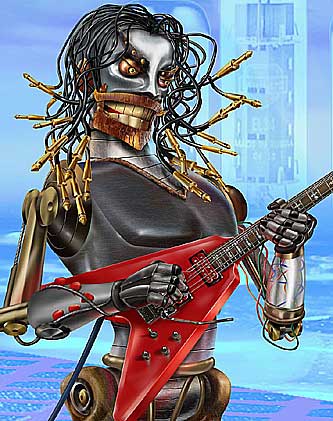 mwe3:
How does the Clark Colborn Again solo album represent a move
forward from your early work as a musician and how would you compare
the style and approach with your 2004 Clark Plays Guitar CD?
What was the chemistry like working with drummer Joel Baer on the
new album?
mwe3:
How does the Clark Colborn Again solo album represent a move
forward from your early work as a musician and how would you compare
the style and approach with your 2004 Clark Plays Guitar CD?
What was the chemistry like working with drummer Joel Baer on the
new album?
CC: Let’s go back to Clark Plays Guitar first,
so there is a frame of reference for Again. When I made Clark
Plays Guitar my mind was in a really strange place. At least it
seems that way to me now, looking back. I had taken quite a few years
off from music. The business side of it had ground me down, and the
enormous frustration of trying to have a band made up of talented,
responsible, and ambitious people but instead getting people mostly
interested in partying first, getting laid second, following their
favorite sports team third, and the band as a very distant fourth
. Well, it made me hate music. Or so I thought at the time. What I
actually hated was the circumstances surrounding me and my music at
the time. Anyway, I quit playing music, I quit listening to music,
and I avoided anyone and anything associated with music for years.
Then a series of events occurred that made me realize I’m hard-wired
to make music, I can’t live as a rational, sane human being if
I can’t make music. It would take too long to explain everything
that happened, so I’ll just leave it at that. Anyway, as soon
as I had this realization, this re-awakening, I also realized that
I could avoid many of the things that had nearly killed music for
me, and just write and record music by myself. Home recording was
affordable and not out of reach, so I started writing and recording
just as an outlet, with no intentions of releasing it to the public
or having a band. My writing at that point was very experimental,
and not geared for a band, for the most part. I would start writing
a piece, have another idea and jump to that for a while, then have
still another idea and focus on that, and just keep repeating this
process. Sometimes I would go back to an earlier piece and develop
it some more, until I was happy with it or struck with new inspiration,
then I’d move on again. I had piles of tapes with partially
completed compositions. Then another series of events occurred that
changed things.
Let’s skip all the dull details again, other than to say the
first part of that series was when some friends heard a couple of
the completed songs, and started hounding me to release an instrumental
album. It was like the first domino in a row of events where things
just seemed to fall into place, so I said, “Why not?” But
a funny thing happened to my mindset once I had committed to making
an album. I began  trying
to play it safe with the songs. I would try to imagine what the public
would accept or like, and this would make me fearful about some of
the more unusual compositions. Plus, there were some things happening
with the health of my hands that initially made me think this would
be the only album I would ever make, and that time was running out
on my window of opportunity. So I held back a bit, keeping most of
the songs shorter than they might have been otherwise, and not going
in any direction that I thought was too “out there,” if
that makes sense. Plus, I think that I probably said “good enough”
on some aspects of that first album that could have been closer to
my vision if I had believed I had more time. I abandoned some tracks
that I didn’t think could be performed live, should I decide
to put a band together, although I did leave several on the album
that I thought might not ever be played live, just because I thought
they would touch people in some way. So in the end, I was happy with
the Clark Plays Guitar album, but looking back I realize some
of the compromises I made.
trying
to play it safe with the songs. I would try to imagine what the public
would accept or like, and this would make me fearful about some of
the more unusual compositions. Plus, there were some things happening
with the health of my hands that initially made me think this would
be the only album I would ever make, and that time was running out
on my window of opportunity. So I held back a bit, keeping most of
the songs shorter than they might have been otherwise, and not going
in any direction that I thought was too “out there,” if
that makes sense. Plus, I think that I probably said “good enough”
on some aspects of that first album that could have been closer to
my vision if I had believed I had more time. I abandoned some tracks
that I didn’t think could be performed live, should I decide
to put a band together, although I did leave several on the album
that I thought might not ever be played live, just because I thought
they would touch people in some way. So in the end, I was happy with
the Clark Plays Guitar album, but looking back I realize some
of the compromises I made.
When I made Again I just let go. I recorded a bunch of tunes
that I wrote specifically for performing live, and several that were
really just pieces I had written for myself. I made no effort to “adjust”
the songs to make them more palatable to the masses. I just wrote
& recorded whatever came out of me, with the hopes that it might
appeal to fans of music that is kind of different. I let the tunes
go where they wanted to go... If they need to be longer to get it
all said musically, then so be it. If they need to have lots of changes
in the time signatures, that’s okay. And I think the end result
is that this album is more representative of me as a guitarist, performer,
& composer—more powerful in its artistic statement, yet at
the same time actually more accessible to the listeners.
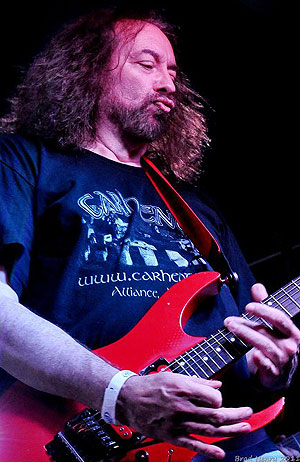 Another
thing that is quite different this time around is my studio. I have
made a bunch of upgrades, so I have far fewer limitations in the actual
recording process. And I’m a much better recording engineer now.
I’ve made a ton of demos, recorded other artists and worked at
learning more about the craft of recording, which actually allows
me to focus more on the creation of the music because the recording
side takes less concentration now.
Another
thing that is quite different this time around is my studio. I have
made a bunch of upgrades, so I have far fewer limitations in the actual
recording process. And I’m a much better recording engineer now.
I’ve made a ton of demos, recorded other artists and worked at
learning more about the craft of recording, which actually allows
me to focus more on the creation of the music because the recording
side takes less concentration now.
There are other differences this time around, too. The health of my
hands is way better and I’ve gone back to playing live, which
admittedly had an effect on some of the song choices for Again,
but not in any sort of limiting way. I’ve gotten a little more
comfortable with my voice, so I added a few vocal tunes and my studio
upgrades allowed me to work with a live drummer this time, which leads
me to respond to your question about the chemistry with Joel Baer.
Joel and I started playing live together about 3 or 4 years ago, but
then he went off to finish his music degree about 2 years ago. We
stayed in touch, and when I started to get serious about recording
this new album I reached out to him with the idea that he would be
one of 3 drummers to contribute to the album. I had the idea that
he would play most of the tunes, but a couple of old band-mates would
contribute as well. Things weren’t working out with the other
guys in terms of scheduling, and once Joel came in and did the first
couple of tracks I just felt that he was the best guy for the whole
album. Joel is a great player, totally comfortable with my odd time
signatures, mid-song meter changes, and tempo changes, whatever I
throw at him. Plus I can make noises with my mouth trying to describe
what I want him to play, that he interprets perfectly, or I can say
something like “go all Gavin in this part” and he knows
what I’m looking for as a drum part, so we really do have some
great chemistry. He would come in on a weekend, or when he had a day
off from school, and we would totally hammer it in the studio. He
would be really hard on himself sometimes, and just work relentlessly
on nailing a part. His efforts are such a huge part of what makes
the album sound so good.
mwe3: After hearing the new CD, it sounds like you’re
equally fascinated with rock instrumentals and vocal tracks too. How
do you describe and compare your sonic, compositional and recording
approach to your own rock vocal and instrumental music?
CC: Well, I’ve always been a fan of instrumental music.
What drew me to the guitar in the first place were the instrumental
surf hits of guys like Dick Dale, Duane Eddy and Link Wray. Of course
I was also captivated by Jimi Hendrix, Jeff Beck, Cream-era Clapton,
Jimmy Page and the mighty Zep, all of whom focused mainly on songs
with vocals, yet still featured lots of cool guitar. So I became interested
in using lyrics and vocals as part of the compositional palette, but
I have always found the most enjoyment in listening to really well
composed, or improvised instrumental passages. So that tends to be
where I also find most of my musical expression—using instruments
to convey emotion, to channel energy, to build a sensation of movement
within the listener. Yet at times, lyrics and melodies just pop into
my head—they nearly force themselves into the songs. So I treat
the vocal like another instrument. I find a space for it, and shape
it into something that compliments the overall feel of the music,
but still lets the lyrics come across. My voice is low, so I can’t
write vocal parts that would fit Ronnie James Dio, they have to work
within my limitations, and luckily baritone rock vocals have become
very common.
 I
don’t do too much doctoring of the vocals in the studio. As long
as I take the time to get a good take it will be okay. I use a decent
large diaphragm mic, a tube pre-amp, throw a little reverb and maybe
a bit delay on to it and let it be. I don’t want to over-produce
the vocal. It’s important that the rawness of the performance
comes through. Too many recordings today are so over-produced that
they hardly resemble what actually happened in the studio. I don’t
want that. Take me with my warts and all, as the saying goes. I’m
not looking to be the next vocal sensation. I just want to touch people
with my music, and being human makes that more likely.
I
don’t do too much doctoring of the vocals in the studio. As long
as I take the time to get a good take it will be okay. I use a decent
large diaphragm mic, a tube pre-amp, throw a little reverb and maybe
a bit delay on to it and let it be. I don’t want to over-produce
the vocal. It’s important that the rawness of the performance
comes through. Too many recordings today are so over-produced that
they hardly resemble what actually happened in the studio. I don’t
want that. Take me with my warts and all, as the saying goes. I’m
not looking to be the next vocal sensation. I just want to touch people
with my music, and being human makes that more likely.
mwe3: And how about rock vocal influences compared to instrumental
guitar hero influences? What artists had the biggest impact on the
many musical sides of Clark Colborn?
CC: Vocal influences… hmmm, that’s hard. I can’t
sing anything like the guys I really admire. My voice is just too
low. I love Jack Bruce’s vocals with Cream. Three guys that I
really liked are gone now—Brad Delp, Freddie Mercury and Ronnie
James Dio. One guy that I can say influenced me is Kevin Moore,
of OSI. I’ve been told I sing like him, which is not intentional,
but it’s true that when I heard the first OSI record I thought
“Wow! His range is as limited as mine! I could put some
vocal tracks on my next record!” Another vocal influence, in
a way, is Gary Hoey. Gary used to only record instrumental albums,
but in the past several years he has done some really good vocal oriented
records. I met him several years ago when we were both represented
by the same booking agent. We both fired the guy almost immediately;
he was a complete scam artist. During a conversation Gary encouraged
me to learn to sing, saying he had done so and it had given him more
tools as a composer, artist, and performer. Gary is a really good
vocalist, far better than I will ever be, I think, but his encouragement
coupled with finding OSI about that time influenced me to give it
a go.
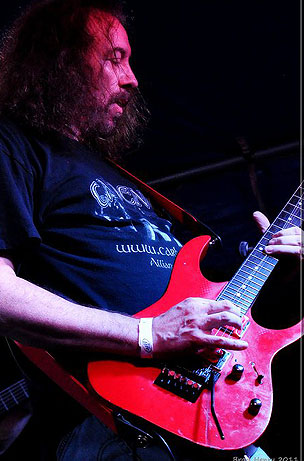 Guitarist
influences are easier to list: the previously mentioned Dick Dale,
Link Wray, Duane Eddy, Jimi Hendrix, Jimmy Page, Jeff Beck, Cream-era
Clapton, plus Ritchie Blackmore, Johnny Winter, Frank Zappa, Uli Jon
Roth, UFO era Michael Schenker, Brian May and of course Eddie Van
Halen. Other guitarists I really admire are Steve Vai, Steve Howe,
Joe Satriani, Paul Gilbert, Steve Stevens, John Petrucci and Dweezil
Zappa. I love all of those guys and try to draw inspiration from them
without copping their signature sound.
Guitarist
influences are easier to list: the previously mentioned Dick Dale,
Link Wray, Duane Eddy, Jimi Hendrix, Jimmy Page, Jeff Beck, Cream-era
Clapton, plus Ritchie Blackmore, Johnny Winter, Frank Zappa, Uli Jon
Roth, UFO era Michael Schenker, Brian May and of course Eddie Van
Halen. Other guitarists I really admire are Steve Vai, Steve Howe,
Joe Satriani, Paul Gilbert, Steve Stevens, John Petrucci and Dweezil
Zappa. I love all of those guys and try to draw inspiration from them
without copping their signature sound.
Bands that influenced me are all over the place: I liked The Beatles
and some of the Rolling Stones stuff... The Who, Cream, of course,
Deep Purple, Wishbone Ash, King Crimson, Captain Beyond, The Flock,
Kansas, early Scorpions, early Judas Priest, UFO, Alice Cooper, early
Queen, Blue Cheer, Jefferson Airplane, Black Sabbath, Led Zeppelin,
The Move, Hydra, Aerosmith, Vanilla Fudge, Ursa Major and ZZ Top.
Probably some others that I’m forgetting. With all of these bands
it was the music that drew me in, not the vocals &/or lyrics,
but the riffs and interplay between guitars, drums, bass, & keyboards.
For some reason I am always more moved by well crafted instrumental
parts than clever lyrics—which explains why Bob Dylan & Bruce
Springsteen aren’t anywhere to be found in my house.
I can’t really pinpoint any single person or band as being a
pivot point for me. In my formative years I was like a musical sponge—I
soaked it all in completely. I remember learning every guitar part
on every song on Led Zeppelin II, then doing the same thing
on the American debut of Black Sabbath. Then I would head downtown
to get the sheet music for some classical piece like “Sabre Dance”
and try to arrange that for a rock band. I would spend days visiting
guitar stores, trying to find out what gave that lead line in “American
Woman” by The Guess Who such an awesome sound. I would hang out
with funk players to try to get a feel for those great Motown guitar
phrases that would get everyone on their feet. Every new thing would
captivate me for a while, and once I felt I had a grasp of how something
could help me express myself musically, I would move on. There was
so much good, innovative stuff coming out in those days that I was
never without a source for inspiration.
mwe3: The cover art for the Clark Colborn Again album
should win a Grammy! (lol) Can you inform us about the origins and
design (hidden meaning?) of the CD cover art?
CC: I agree! Michael Morris did an incredible job on the cover,
absolutely perfect. The cover of my first album, the Clark Plays
Guitar album, seemed to work against it. I loved it. I thought
it conveyed a sense of whimsy, showed that I didn’t take myself
too seriously, and it had a retro, comic book feel that I felt gave
a hint of the super-hero/guitar-hero connection. The feedback I got
on it was that it really didn’t give enough of a sense of what
my music was like. I was not going let that be an issue with Again.
I had multiple objectives with this cover. First, I wanted it to be
reminiscent of the grand covers of the vinyl era—just great artwork
capable of standing on its own merit. Second, I wanted it to convey
a sense of the unusual, something familiar yet strange, something
other-worldly. And third, I wanted it to reflect the harder aspect
of most of the tunes, the metal side of what I do. I had a kind of
terminator/guitarist vision, set in some kind of world where everyone
is mechanical, robotic, and they’re all drawn to him. Yet I didn’t
want it to be scary, cliché horror art that is on so many metal
covers today. And last, I wanted to still tie the look of both albums
together somehow.
So I sent all of my crazy ideas and some mock-up art that I’d
done to Michael Morris in Colorado, along with the pre-mastered songs
so he could have an audio reference to inspire his visual output,
and he put just the right amount of intimidation, whimsy and hi-tech
into the cover. He actually created components of the artwork from
photos of my effects pedals, my amp and my speaker cabinets. He did
an awesome job. If you know someone that can nominate him for that
Grammy, by all means encourage them to do it. It’s the coolest
cover I’ve seen in years, if I do say so myself.
Sometimes I jokingly say that the cover is meant to symbolize the
dichotomy of the musical diversities and freedoms imparted by the
very same conditions that have imposed a post-industrial dependence
on an electro-mechanical, Jungian surrogate which provides the vicarious
social proxy now embraced by the collective and undiscerning pawns
of an elitist, affluent minority. Although I say it as a joke, it’s
also true...
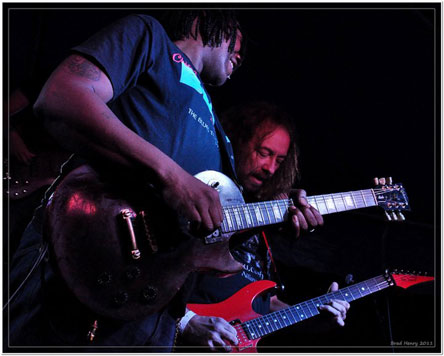 mwe3:
That's a pretty cool guitar on the new CD cover art. What guitars
do you bring out of your arsenal and feature on the Clark Colborn
Again CD and can you say something about your guitar and amp combination
live and in the studio and as far as matching sounds and, how about
enhancing effects you use in the recording and mixing stages?
mwe3:
That's a pretty cool guitar on the new CD cover art. What guitars
do you bring out of your arsenal and feature on the Clark Colborn
Again CD and can you say something about your guitar and amp combination
live and in the studio and as far as matching sounds and, how about
enhancing effects you use in the recording and mixing stages?
CC: Most of the guitar tracks on Again were recorded
with a “Frankenstein” I have. It’s a floating trem/locking
nut equipped, 24 fret beast that I’ve put some new humbucker
pick-ups and control electronics into, and painted red with a can
of spray paint. I’ve used that guitar live for quite a few years,
but towards the end of recording the album I damaged a couple of the
frets, to such a degree that I can’t play it. The cost of fixing
it may be more than it’s worth, so the electronics may move to
a Schecter Flying V that I have. In fact, the guitar on the cover
is a blend of the red Frankenstein and that Schecter, which is currently
white, that Michael drew at my request. So maybe that’s the way
to go. I’ve got more spray paint. (lol)
I also used a Schecter baritone that I have for a couple tracks, and
a couple of my vintage Gibsons made it onto the album, as well. Typically
I run a humbucker equipped guitar through my Randall MTS RM100 head,
which feeds a Randall 4x12 cabinet loaded with Celestion Greenbacks.
The weird thing I do is to use a large diaphragm, fixed cardioid pattern
condenser microphone, instead of a dynamic mic like a Shure SM57.
I run it though a tube pre-amp, into a decent A/D converter, then
into Sonar X1 Producer.
One problem with recording is that you are not getting the same power,
the same sense of massiveness a listener gets from the live experience.
Live, you have multiple 12-inch speakers pumping out the guitar on
stage 4, maybe 8, maybe even more, and a boatload more speakers pumping
it out over the P.A. system. Each speaker has miniscule tone differences,
and each resonates a tiny bit differently than the rest, and this
creates a thick, massive sound. One of the tricks I use to get my
recordings to have a similar feel to this is to record multiple takes
of each guitar part and place them in different places in the soundscape.
I alter the tone a tiny bit for each take. Sometimes I change the
placement of the mic a tiny bit. It’s a technique called “doubling.”
This is very common on major label recordings. I usually record 2
tracks of each distinct part, although the guitar solo on “Lie
To Me” was triple-tracked. Some of the other solos are doubled,
but not all of them. Once in a while the mic placement is just so
perfect that you get a huge tone without having to double the track.
mwe3: Also how do you balance your own keyboard and bass playing with
your overall guitar-centric approach on the Clark Colborn Again
CD?
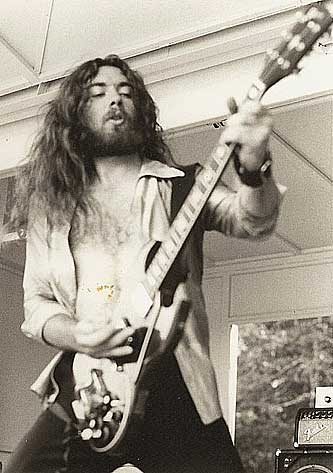 Because
I am primarily a guitarist, much of what I hear in my head when I’m
imagining new music is guitar. But frequently I have distinct ideas
for other instruments as well, which might become the genesis for
a song. Often I hear everything at once in my head—guitar, bass,
drums, key—and I have to sort it out as I record or transcribe.
Sometimes I will switch things up in the studio. I might use a piano
to play a part I do on guitar live, or use a piano to double a bass
part. There are things you can do live that will work really well
from the stage, yet might not have the same impact on a recording,
and vice-versa. So I try to find the optimal way to perform it for
each medium. I have some songs that are very keyboard heavy that might
make it onto the next album. Since I really consider myself to be
a guitarist that dabbles on bass, keyboards and drums, I don’t
work much on improving on anything other than guitar. I still feel
like I haven’t mastered the guitar, so I only get good enough
on the other instruments to play what I need for the recordings.
Because
I am primarily a guitarist, much of what I hear in my head when I’m
imagining new music is guitar. But frequently I have distinct ideas
for other instruments as well, which might become the genesis for
a song. Often I hear everything at once in my head—guitar, bass,
drums, key—and I have to sort it out as I record or transcribe.
Sometimes I will switch things up in the studio. I might use a piano
to play a part I do on guitar live, or use a piano to double a bass
part. There are things you can do live that will work really well
from the stage, yet might not have the same impact on a recording,
and vice-versa. So I try to find the optimal way to perform it for
each medium. I have some songs that are very keyboard heavy that might
make it onto the next album. Since I really consider myself to be
a guitarist that dabbles on bass, keyboards and drums, I don’t
work much on improving on anything other than guitar. I still feel
like I haven’t mastered the guitar, so I only get good enough
on the other instruments to play what I need for the recordings.
mwe3: The new CD sounds great. What steps did you take to make
sure the sound was the very best it could? How did you get your new
recording to have such a clean sound in the final sound on the CD?
Recordings as good as yours with artwork as cool is reason enough
for the recording medium to keep the original CD concept alive.
CC: I was very careful during every step to manage the levels,
the recorded volume, of everything. I would make certain the microphone
was not distorting due to an amp being too loud, or the mic too close,
for example. In the old days we would try to get everything in the
signal chain right on the verge of “red-lining” as it went
to tape, because that would impart a really big, thick sound on tape.
With so much of the recording process being in the digital realm these
days, you can’t do that. The old analog equipment was very forgiving
with distortion—the new digital gear is not, so you can’t
let things “red-line” at all.
So that’s the first part, keeping the levels under control. Then
you have to spread the mix out with panning, or “balance”
as the consumer equipment is labeled. This keeps things from “piling
up” in the stereo spectrum. Plus, you want to balance frequencies.
So many recordings are way too bass heavy because they have the low
frequencies of the kick drum boosted, the bass guitar lows boosted,
the down-tuned guitars low end boosted, and maybe some low synth,
all competing for the same frequency range. It just makes a mess of
the final product.
Another thing I did was to go into every individual track and completely
remove any sound during the parts where that particular instrument
was not actually playing. This really cleans the mix up—keeps
the noise to a bare minimum. You’ll always have noise, but why
not reduce it as much as possible?
The final touch is not taking part in the “loudness wars.”
Google that phrase, “loudness wars,” to see what it’s
all about. In essence, when you do the final stereo mastering (which
is different than the mixing) you can try to make your record louder
than the next guys by using something called compression. But too
much compression takes away all the dynamics, actually amplifies any
residual noise, and at some point you reach the maximum volume that
can be reproduced on a CD or MP3 or vinyl, there are physical limits.
Studies have proven that a listener’s ears will fatigue much
faster when listening to recordings that are maxed out in this way,
and the end result is that they don’t want to listen to the music
for as long. So I asked my mastering engineer to keep the dynamics
in tact, and to go as loud as we could without getting into the loudness
wars. He did a great job.
And of course, getting actual pressed CDs done by a big company
rather than burned CDs from one of these “quickie” services
will always be important in the end product.
mwe3: Who were some of the other people important to making
the Clark Colborn Again CD work out so well? For instance,
others involved in the mixing, mastering, pressing, PR, marketing,
endorsements, gear companies?
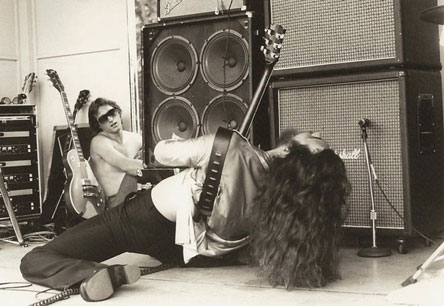 CC:
Since we were just talking about mastering, I should give a huge shout
out to Ty Tabor for the mastering. Ty is the guitarist and one of
the vocalists in King’s X, and he is also a great mastering engineer.
He put up with my incessant emails, endless questions and overall
craziness and turned out a great product. Pressing was done by Oasis
CD Manufacturing, they were great, and always do an excellent job.
CC:
Since we were just talking about mastering, I should give a huge shout
out to Ty Tabor for the mastering. Ty is the guitarist and one of
the vocalists in King’s X, and he is also a great mastering engineer.
He put up with my incessant emails, endless questions and overall
craziness and turned out a great product. Pressing was done by Oasis
CD Manufacturing, they were great, and always do an excellent job.
My amps are Randalls, and John Vitale, the artist relations director,
was a huge help in getting my endorsement with them as well as helping
me get the right amp for my sound.
Gary Hill, of Gary Hill PR, has been a terrific help in getting the
word out about the new album and of course Michael Morris deserves
tremendous praise for his truly world-class cover art, not to mention
the moral support he gave me along the way. My friend and drummer
Joel Baer was indispensable with his drumming and input during the
whole thing. And I can’t overstate how important the support
of my family was to getting this album done. I couldn’t have
done it without them.
I’m sure I’m forgetting someone. Hopefully they’ll
understand and forgive me!
mwe3: Can you say something about where you live now and where
you grew up and do you have any other hobbies or interests outside
of the music world?
CC: I live about 90 minutes west of downtown Chicago, in the
city where I grew up, Rockford. It’s the home of Cheap Trick,
Aidan Quinn, Jodi Benson (Ariel in The Little Mermaid), Michelle
Williams of Destiny’s Child, and a couple other celebrities,
but oddly enough doesn’t have a vibrant music or live theater
scene.
Hobbies or interests... hmmm... Outside of my family, music pretty
much dominates my life! (lol) I used to be quite involved in martial
arts. I taught for several years, but too many hand and arm injuries
caused me to mostly leave that behind. When I was trying to avoid
being a musician I became a master scuba instructor, and I still like
to dive for fun when time permits. I do some woodworking on occasion,
but for the most part I spend every waking moment involved in some
activity centered on music. Other than when I’m hanging with
my family, that is. I’m writing songs, practicing difficult parts,
having band rehearsal, doing promotional stuff, creating new graphics
for the web site or flyers or promo material, chasing gigs, fixing
guitars, modifying amps and guitars, giving interviews, judging band
battles, making videos, meeting with concert promoters or potential
managers, researching venues or festivals, reading music business
journals and blogs, sending materials to radio stations and music
publications, lining up photo shoots, and on and on goes the list.
But that’s what happens when you do what you love, you completely
immerse yourself in it. My wife has to drag me out of the studio sometimes,
I just lose track of time.
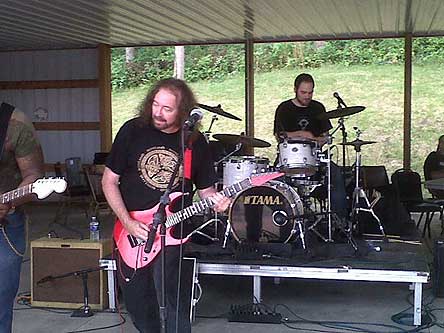 mwe3:
What about future plans for you as far as writing and recording new
music in the future. Are there any other musicians you’d like
to work with and or produce or be produced by and are you planning
any live shows or any other big events?
mwe3:
What about future plans for you as far as writing and recording new
music in the future. Are there any other musicians you’d like
to work with and or produce or be produced by and are you planning
any live shows or any other big events?
CC: I’m always writing. I hope to turn out new albums
on a more regular basis now that my studio is pretty stable. I have
some ideas for a couple of unusual projects, but those will come together
in between my main projects, which will be more albums like Again.
I talked to Tony Levin about doing a track on this one, but he said
he couldn’t improve on the bass track that was already there,
so we left it open for working together on some future project. I’d
like that, Tony is amazing.
There are so many other players that would be fun to collaborate with,
I don’t even know where to start. Jordan Rudess (Dream Theater),
Kevin Moore (OSI), Steve Vai, Billy Sheehan, Paul Gilbert and that’s
just for starters.
I’ve been trying to find a promoter to help me put together something
like Joe Satriani’s G3 tour, with Gary Hoey, me, and a third
guitarist. So far it’s still just in the “can we do this?”
stage, but I’m going to keep hammering at it. That would be a
blast.
My new live band, which is me, Joel Baer and an outstanding bassist
from Chicago named Sam Lalk, will be hitting stages in the Midwest
this summer, and we want to get a tour put together for the fall.
We really need a promoter or a decent management company to jump in
right about now, because it’s getting to the point where there
is more to do than what I can handle alone. I suppose that will be
my next big project, finding a great management team to work with.
 I
have a video for the single “Lie to Me” coming out April
27, 2012, and then we’ll be starting production on a new video
with the goal of getting 3 or 4 out this year. If the budgets are
there, that is. Hopefully we can kick the sales of Again up
enough to finance the videos.
I
have a video for the single “Lie to Me” coming out April
27, 2012, and then we’ll be starting production on a new video
with the goal of getting 3 or 4 out this year. If the budgets are
there, that is. Hopefully we can kick the sales of Again up
enough to finance the videos.
Beyond that, it’s wide open. I’ll continue the “write-record-perform”
cycle until they put me into the ground, probably. (lol) I’m
always open to ideas, and ready to tackle any opportunity that makes
sense, so anything is possible! Right now I want to focus on getting
out and playing a bunch of this new stuff for everybody, so if you
see we’re coming to a venue near you, please come to the show.
You will definitely be entertained!
Thanks to Clark Colborn @ www.ClarkPlaysGuitar.com

